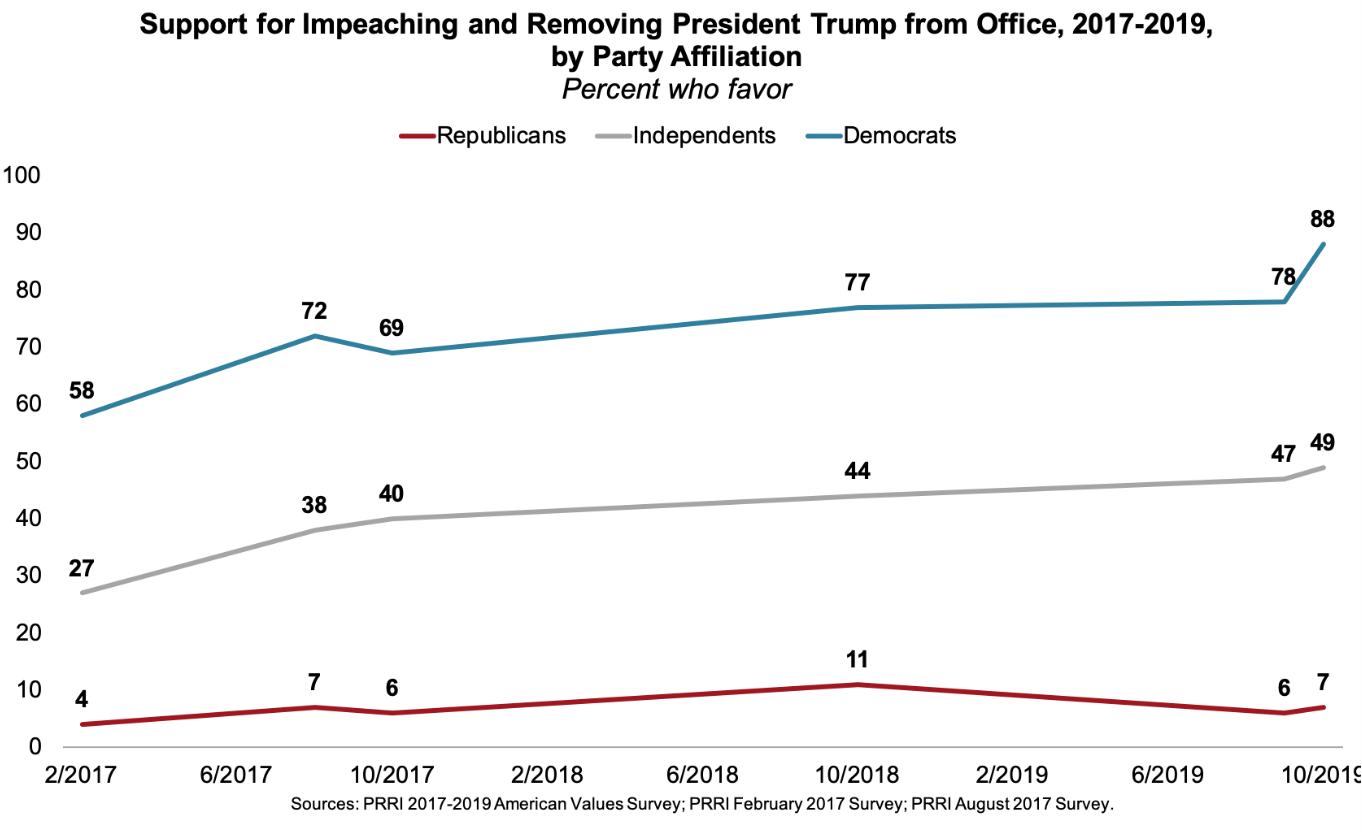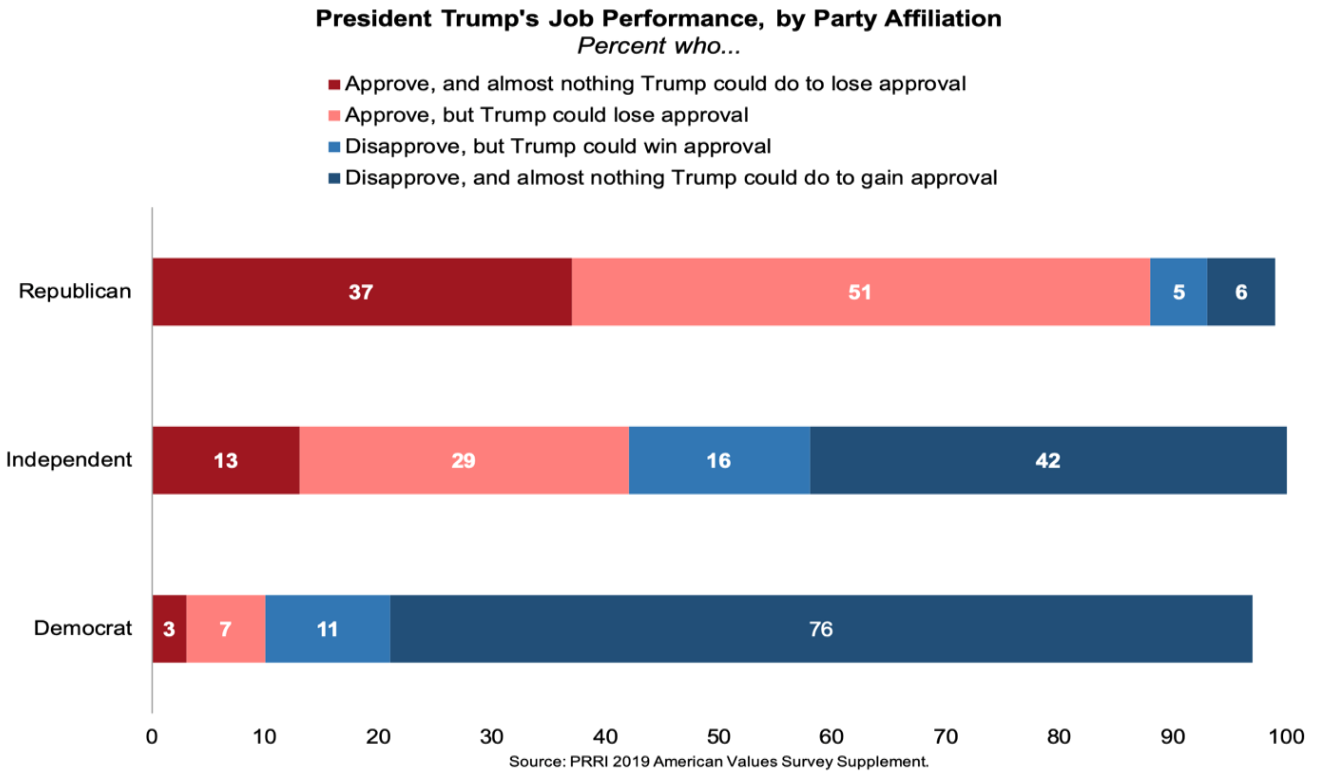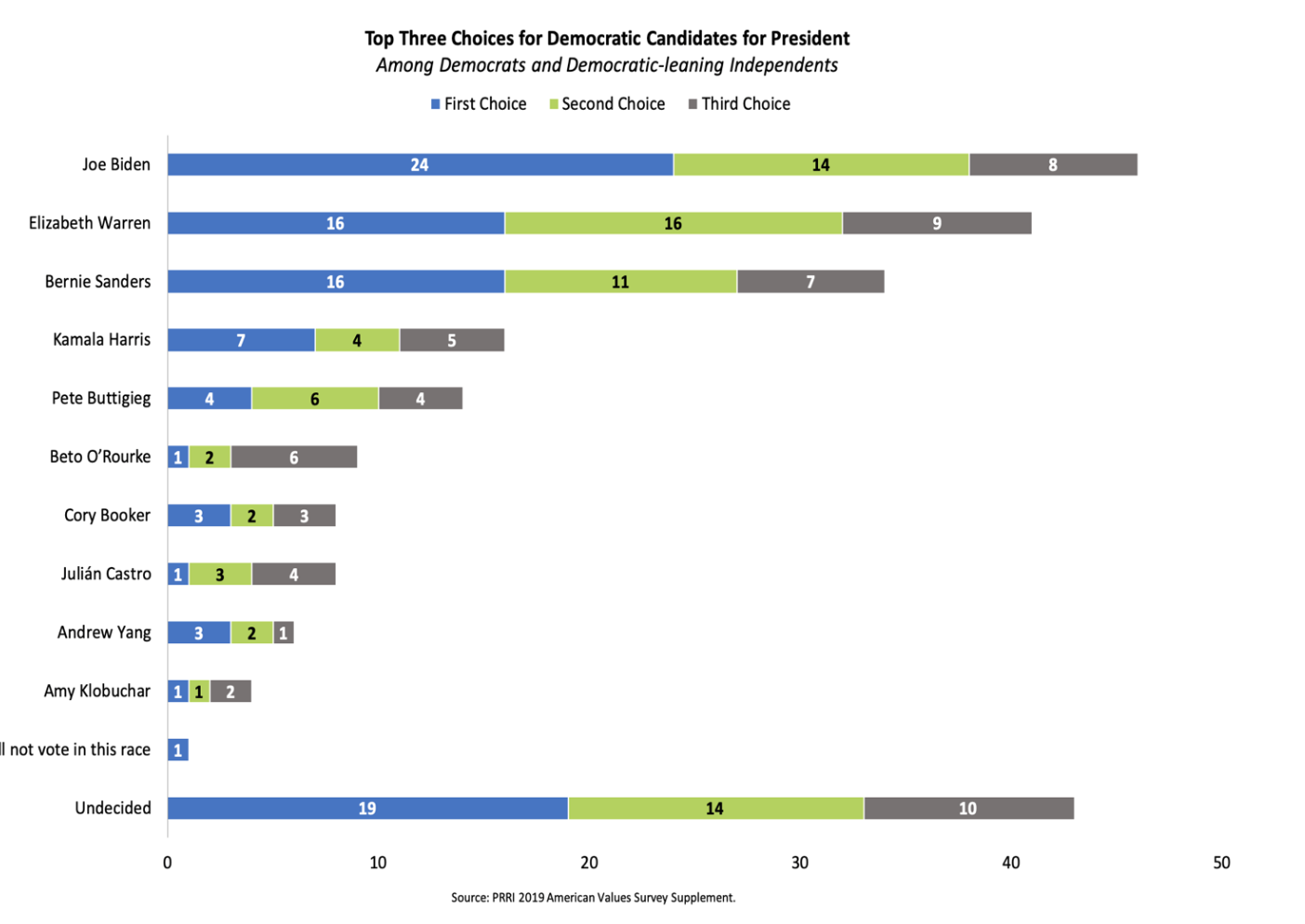As of mid-October, a slim majority (51%) of Americans support impeaching and removing President Donald Trump from office, compared to 47% who do not think the president should be impeached and removed. This marks an increase of four percentage points from mid-September, prior to the announcement of an impeachment inquiry, when 47% of Americans supported impeachment and removal and a majority (53%) opposed it.
The increase in support for impeachment and removal is driven by a 10 percentage point surge in Democratic support, up from 78% in mid-September to nearly nine in ten (88%). Republican (7%) and independent (49%) support for impeachment and removal is unchanged from the mid-September levels (6% and 47%, respectively). More than 9 in 10 (93%) Republicans remain opposed to impeaching Trump and removing him from office.
This is the first time since Trump has taken office that a majority of Americans have supported impeaching the president. One month into his presidency, 30% of Americans, including a majority (58%) of Democrats, supported impeachment and removal. As Trump’s term in office has progressed, support for his impeachment and removal has increased among Democrats and independents, while Republican support remains very low.

Opposition to impeaching Trump remains high among important Republican subgroups: 98% of Republican white evangelical Protestants and 93% of all white Republicans oppose impeachment and removal. There is no difference in support for impeachment and removal by education level among white Republicans: 93% of white Republicans without a college degree and 94% of those with a college degree oppose impeachment and removal.
Support for impeachment and removal has grown among some white subgroups, however. Nearly four in ten (37%) whites without a college degree support impeaching Trump and removing him from office, up from 31% in mid-September. This change is driven by white women without a college degree, 40% of whom favor impeachment, up from 29% in mid-September. White men without a college degree have not moved substantially from 33% in mid-September to 35% in mid-October.
Similarly, support for impeachment is up seven percentage points among college-educated whites over the last month (from 46% to 53%). Among those uncommitted Americans who say their vote depends on who the Democratic nominee is, half (50%) say Trump should be impeached and removed from office, up from 41% in mid-September.
Trump Approval Largely Unchanged, Republicans Still Want Trump in 2020
Despite the announcement of an impeachment inquiry and increased support for impeachment and removal, Trump’s job approval rating increased slightly to 43% from 39% approval in mid-September. Disapproval is down to 56% from 60%. This approval bump is largely due to increased support among independents over the last month, from 36% approval to 43%.

Shifts in the intensity of Trump support are largely confined to Democrats who disapprove of the president’s job performance. Among Democrats who disapprove of Trump’s job performance, 87% say there is almost nothing Trump could do to win their approval, up four percentage points from 83% in mid-September. Among those who approve of Trump’s job performance, more than one third (35%) say there is almost nothing he could do to lose their approval, a number that is unchanged since mid-September.
Republicans and Republican-leaning independents still overwhelmingly prefer Trump (73%) to someone else (26%) as their presidential candidate in 2020. This number is unchanged since mid-September.
One-Third of Americans Report Being Uncommitted in 2020 Vote for President
Among the broader population, most Americans (64%) are already committed to either supporting Trump (27%) or the Democratic nominee (37%) in the 2020 election, regardless of who wins the Democratic nomination. Nearly one-third (34%) of Americans, including a similar proportion of registered voters (33%), say it depends on who wins the Democratic nomination. These numbers did not change in the wake of the impeachment inquiry announcement.
The profile of this uncommitted group is complex. They are more likely to identify as independent (37%) than Democrat (23%) or Republican (20%). They are also younger than Americans who are committed to a candidate; nearly three in ten (28%) are under the age of 30, compared to only 22% of those committed to a Democratic candidate and 11% of those committed to Donald Trump. They are also less likely to vote in 2020 compared to Americans who are committed to a candidate (50% vs. 80%, respectively).
When asked which Democrats they would support over Trump, less than one in five (18%) did not choose any of the candidates. More than eight in ten (82%) chose at least one Democrat, with 32% saying they would select Sen. Bernie Sanders (I-VT) over Trump, 31% choosing former vice president Joe Biden, and 24% indicating they would choose Sen. Elizabeth Warren (D-MA) over Trump. Around one in ten chose Sen. Cory Booker (D-NJ) (13%), Sen. Kamala Harris (D-CA) (12%), businessman Andrew Yang (12%), former Housing and Urban Development Secretary Julián Castro (9%), Rep. Tulsi Gabbard (D-HI) (9%), Sen. Amy Klobuchar (D-MN) (9%), and Mayor Pete Buttigieg (8%) over Trump.
Biden, Sanders, Warren Leading Democratic Candidates
Biden leads the Democratic candidates, with nearly one in four (24%) Democrats and Democratic-leaning independents selecting the former vice president as their top choice. Sanders and Warren are the only other candidates in double digits, with 16% of Democrats and Democratic-leaning independents selecting each as their first choice. Harris (7%), Buttigieg (4%), Booker (3%), and Yang (3%) are the only others to get above 1% support as first-choice candidates. Nearly one in five (19%) Democrats and Democratic-leaning independents report being undecided.

Among the uncommitted Americans who are Democrats or Democratic-leaning independents, 26% say Sanders is their first-choice candidate, followed by 19% for Biden, and only 5% for Warren. Nearly three in ten (29%) are undecided.
Warren (16%), Biden (14%), and Sanders (11%) remain at the top among second choices for Democrats and Democratic-leaning independents. Buttigieg (6%) emerges as the fourth, and Harris (4%) rounds out the top five. Third choices follow the same pattern: Warren (9%), Biden (8%), and Sanders (7%) at the top, with former Rep. Beto O’Rourke (6%) making the top group, followed by Harris (5%), Castro (4%), and Buttigieg (4%).
More than three in ten (31%) Democrats and Democratic-leaning independents say they would not consider author and activist Marianne Williamson. Around one in four say they would not consider Mayor Wayne Messam (27%), former Rep. Joe Sestak (26%), Gabbard (25%), Gov. Steve Bullock (24%), and businessman Tom Steyer (24%). Warren (11%), Harris (12%), Buttigieg (14%), and Castro (14%) have the lowest “would not consider” numbers. Biden (19%) and Sanders (19%) are in the middle of the pack.
Top Candidates’ Favorability
Democrats and Democratic-leaning independents have not substantially changed their views of the top five candidates since mid-September.[1] Sanders has the highest net favorable rating (+54), with 74% favorable and 20% unfavorable views, compared to a nearly identical net favorable rating (+55) in mid-September. Biden’s +45 net favorable rating (68% favorable and 23% unfavorable) is also unchanged since mid-September (+46). Warren ends up with the same net favorable rating of +43 (60% favorable and 17% unfavorable). Harris (+29) and Buttigieg (+24) are also viewed similarly to their mid-September numbers (+31 and +27, respectively).
[1] In the September poll, respondents were given the option “Have not heard of” the candidate as well as “Don’t know”, and in the October poll the single option “Don’t know enough to say” was provided. The latter resulted in slightly higher proportions choosing that response, but the impact on favorable and unfavorable responses among Democrats and Democratic-leaning independents was not significant.
As of mid-October, a slim majority (51%) of Americans support impeaching and removing President Donald Trump from office, compared to 47% who do not think the president should be impeached and removed. This marks an increase of four percentage points from mid-September, prior to the announcement of an impeachment inquiry, when 47% of Americans supported impeachment and removal and a majority (53%) opposed it.
The increase in support for impeachment and removal is driven by a 10 percentage point surge in Democratic support, up from 78% in mid-September to nearly nine in ten (88%). Republican (7%) and independent (49%) support for impeachment and removal is unchanged from the mid-September levels (6% and 47%, respectively). More than 9 in 10 (93%) Republicans remain opposed to impeaching Trump and removing him from office.
This is the first time since Trump has taken office that a majority of Americans have supported impeaching the president. One month into his presidency, 30% of Americans, including a majority (58%) of Democrats, supported impeachment and removal. As Trump’s term in office has progressed, support for his impeachment and removal has increased among Democrats and independents, while Republican support remains very low.

Opposition to impeaching Trump remains high among important Republican subgroups: 98% of Republican white evangelical Protestants and 93% of all white Republicans oppose impeachment and removal. There is no difference in support for impeachment and removal by education level among white Republicans: 93% of white Republicans without a college degree and 94% of those with a college degree oppose impeachment and removal.
Support for impeachment and removal has grown among some white subgroups, however. Nearly four in ten (37%) whites without a college degree support impeaching Trump and removing him from office, up from 31% in mid-September. This change is driven by white women without a college degree, 40% of whom favor impeachment, up from 29% in mid-September. White men without a college degree have not moved substantially from 33% in mid-September to 35% in mid-October.
Similarly, support for impeachment is up seven percentage points among college-educated whites over the last month (from 46% to 53%). Among those uncommitted Americans who say their vote depends on who the Democratic nominee is, half (50%) say Trump should be impeached and removed from office, up from 41% in mid-September.
Trump Approval Largely Unchanged, Republicans Still Want Trump in 2020
Despite the announcement of an impeachment inquiry and increased support for impeachment and removal, Trump’s job approval rating increased slightly to 43% from 39% approval in mid-September. Disapproval is down to 56% from 60%. This approval bump is largely due to increased support among independents over the last month, from 36% approval to 43%.

Shifts in the intensity of Trump support are largely confined to Democrats who disapprove of the president’s job performance. Among Democrats who disapprove of Trump’s job performance, 87% say there is almost nothing Trump could do to win their approval, up four percentage points from 83% in mid-September. Among those who approve of Trump’s job performance, more than one third (35%) say there is almost nothing he could do to lose their approval, a number that is unchanged since mid-September.
Republicans and Republican-leaning independents still overwhelmingly prefer Trump (73%) to someone else (26%) as their presidential candidate in 2020. This number is unchanged since mid-September.
One-Third of Americans Report Being Uncommitted in 2020 Vote for President
Among the broader population, most Americans (64%) are already committed to either supporting Trump (27%) or the Democratic nominee (37%) in the 2020 election, regardless of who wins the Democratic nomination. Nearly one-third (34%) of Americans, including a similar proportion of registered voters (33%), say it depends on who wins the Democratic nomination. These numbers did not change in the wake of the impeachment inquiry announcement.
The profile of this uncommitted group is complex. They are more likely to identify as independent (37%) than Democrat (23%) or Republican (20%). They are also younger than Americans who are committed to a candidate; nearly three in ten (28%) are under the age of 30, compared to only 22% of those committed to a Democratic candidate and 11% of those committed to Donald Trump. They are also less likely to vote in 2020 compared to Americans who are committed to a candidate (50% vs. 80%, respectively).
When asked which Democrats they would support over Trump, less than one in five (18%) did not choose any of the candidates. More than eight in ten (82%) chose at least one Democrat, with 32% saying they would select Sen. Bernie Sanders (I-VT) over Trump, 31% choosing former vice president Joe Biden, and 24% indicating they would choose Sen. Elizabeth Warren (D-MA) over Trump. Around one in ten chose Sen. Cory Booker (D-NJ) (13%), Sen. Kamala Harris (D-CA) (12%), businessman Andrew Yang (12%), former Housing and Urban Development Secretary Julián Castro (9%), Rep. Tulsi Gabbard (D-HI) (9%), Sen. Amy Klobuchar (D-MN) (9%), and Mayor Pete Buttigieg (8%) over Trump.
Biden, Sanders, Warren Leading Democratic Candidates
Biden leads the Democratic candidates, with nearly one in four (24%) Democrats and Democratic-leaning independents selecting the former vice president as their top choice. Sanders and Warren are the only other candidates in double digits, with 16% of Democrats and Democratic-leaning independents selecting each as their first choice. Harris (7%), Buttigieg (4%), Booker (3%), and Yang (3%) are the only others to get above 1% support as first-choice candidates. Nearly one in five (19%) Democrats and Democratic-leaning independents report being undecided.

Among the uncommitted Americans who are Democrats or Democratic-leaning independents, 26% say Sanders is their first-choice candidate, followed by 19% for Biden, and only 5% for Warren. Nearly three in ten (29%) are undecided.
Warren (16%), Biden (14%), and Sanders (11%) remain at the top among second choices for Democrats and Democratic-leaning independents. Buttigieg (6%) emerges as the fourth, and Harris (4%) rounds out the top five. Third choices follow the same pattern: Warren (9%), Biden (8%), and Sanders (7%) at the top, with former Rep. Beto O’Rourke (6%) making the top group, followed by Harris (5%), Castro (4%), and Buttigieg (4%).
More than three in ten (31%) Democrats and Democratic-leaning independents say they would not consider author and activist Marianne Williamson. Around one in four say they would not consider Mayor Wayne Messam (27%), former Rep. Joe Sestak (26%), Gabbard (25%), Gov. Steve Bullock (24%), and businessman Tom Steyer (24%). Warren (11%), Harris (12%), Buttigieg (14%), and Castro (14%) have the lowest “would not consider” numbers. Biden (19%) and Sanders (19%) are in the middle of the pack.
Top Candidates’ Favorability
Democrats and Democratic-leaning independents have not substantially changed their views of the top five candidates since mid-September.[1] Sanders has the highest net favorable rating (+54), with 74% favorable and 20% unfavorable views, compared to a nearly identical net favorable rating (+55) in mid-September. Biden’s +45 net favorable rating (68% favorable and 23% unfavorable) is also unchanged since mid-September (+46). Warren ends up with the same net favorable rating of +43 (60% favorable and 17% unfavorable). Harris (+29) and Buttigieg (+24) are also viewed similarly to their mid-September numbers (+31 and +27, respectively).
[1] In the September poll, respondents were given the option “Have not heard of” the candidate as well as “Don’t know”, and in the October poll the single option “Don’t know enough to say” was provided. The latter resulted in slightly higher proportions choosing that response, but the impact on favorable and unfavorable responses among Democrats and Democratic-leaning independents was not significant.